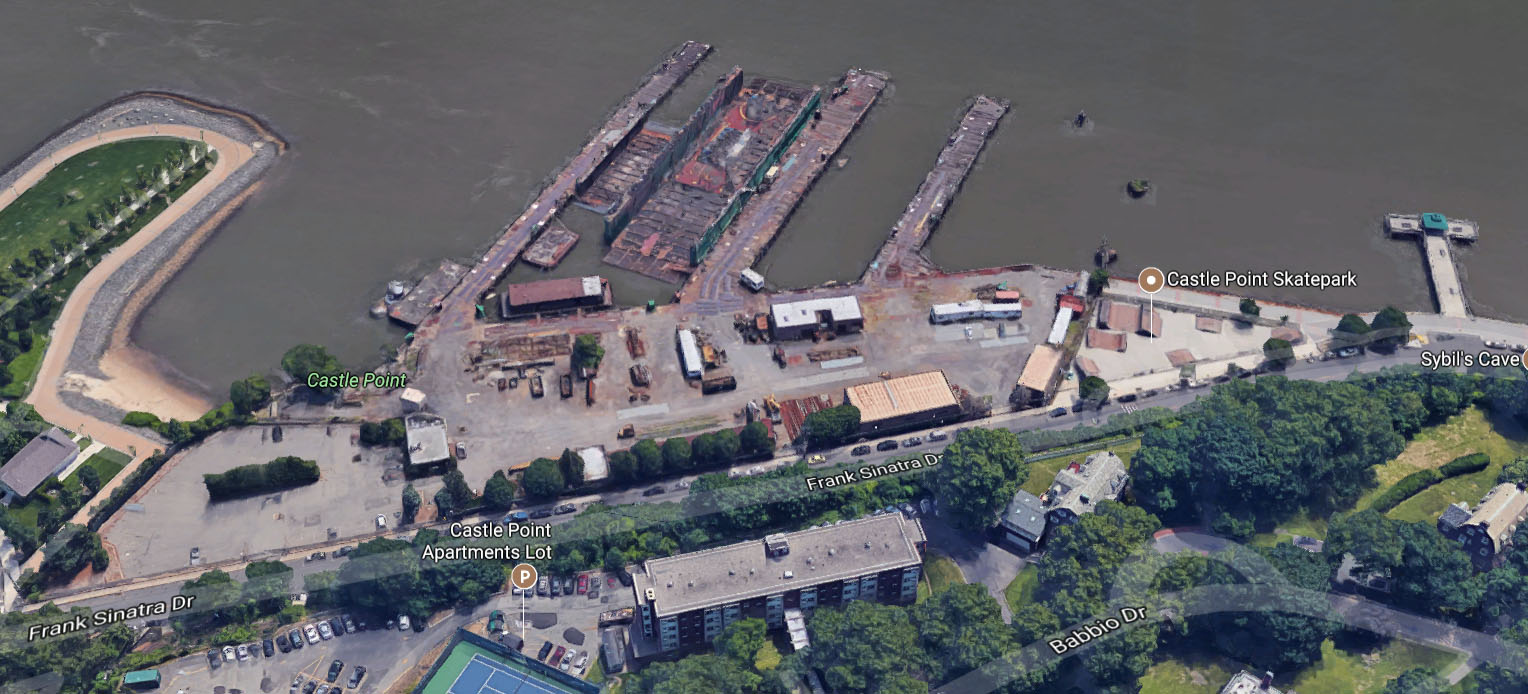A move to complete one of the final gaps in Hoboken’s continuous, public waterfront park

FBW | October 19, 2022
In June 2021, Mayor Ravi Bhalla, along with Governor Phil Murphy, made a dramatic announcement: an agreement had been reached that would allow the City of Hoboken to acquire the Union Dry Dock property from NY Waterway, settling a hard-fought, multi-year battle. That was 16 months ago and the long-anticipated Memorandum of Understanding between the City and the ferry operator has yet to be signed.
In response to this delay, the Mayor announced that the City of Hoboken would adopt an ordinance allowing the City to take the property by eminent domain. The Hoboken City Council approved the ordinance on Wednesday, October 19 in a unanimous vote. In the June 2021 settlement, the City agreed to acquire the site that includes 3.2 acres of land and 5.2 acres under water for $18.5 million. The ordinance sets the price to be offered by the City at $13.36 million, the fair market value determined earlier this year by the City’s appraiser, Lasser Sussman Associates.
The 2021 settlement involved NJ Transit providing much of the funding for a new facility in Weehawken, where NY Waterway would refuel, store and repair its fleet of ferries. Last year, when residents of the Weehawken waterfront saw plans for a greatly expanded facility near their homes, they pressured their mayor, Richard Turner, to withdraw his support for the project. The protracted negotiations over the past 16 months sought a resolution to rebuild the Weehawken facility within NY Waterway’s current footprint and allow for expansion elsewhere, most likely the Hoboken Terminal.
Through an OPRA request in 2018, the Fund for a Better Waterfront (FBW) unearthed a 2009 study by NJ Transit that identified a number of sites for the ferry maintenance facility rated more favorable than Union Dry Dock. One such site was the Hoboken Terminal. FBW obtained additional NJ Transit documents that showed detailed plans at the Hoboken Terminal where ferries could be stored, repaired and refueled. FBW pointed out that the 80-acre Hoboken Terminal property, owned by NJ Transit and currently housing a new ferry terminal, was designated for transportation purposes and would also be acceptable to the Hoboken community for the ferry maintenance facility.
FBW has monitored the status of the Union Dry Dock site going back several decades as the company sought to find a buyer. When the asking price was reduced in 2016, FBW urged former Mayor Dawn Zimmer to have the City acquire the site for use as a public park, thus connecting a three-acre gap in Hoboken’s proposed continuous, public waterfront park. When the City failed to respond, FBW collected over 2,000 signatures on a petition asking the mayor and council to act. Again the Zimmer administration sat on its hands and in November 2017, NY Waterway purchased the Union Dry Dock property.
Ravi Bhalla was elected mayor that same month and took office in January of 2018, making Union Dry Dock his number one priority. FBW organized community residents and local organizations to oppose plans by NY Waterway, NJ Transit and Governor Murphy to move the ferry maintenance and refueling operation to the Dry Dock site. An intense, sometimes acrimonious battle ensued.
Mayor Bhalla brought busloads of people to NJ Transit Board meetings in Newark, forcing the transportation agency to back down several times from their plans to purchase the site from NY Waterway. In 2019, FBW organized the March on March 9 that brought together over 400 people who marched up the waterfront to Maxwell Place Park, just north of the Union Dry Dock site. Organizations joining the march included the Hudson River Fishermen’s Association, Hoboken Cove Community Boathouse, Resilience Paddle Sports and Ke Aloha Outrigger Canoe Club. In July 2018, hundreds showed up for a public hearing and spoke in opposition to NY Waterway’s permit application to the Army Corps of Engineers. FBW also organized letter writing campaigns to the governor and opposition to NY Waterway’s NJDEP waterfront permit.
FBW’s advocacy for a continuous, public waterfront park began in 1990. For the past 32 years, the nonprofit organization’s plan has shaped the development of the Hoboken waterfront. Over the years, parcel by parcel, the park has gradually been built. The Union Dry Dock site is one of the final missing gaps in the park and would connect the skateboard park at the north end of Castle Point Park to the beach and boathouse at Maxwell Place Park. A park at Union Dry Dock, built to an exceptional standard, would serve as a visible, lasting legacy for the Mayor and Council and the many who fought to secure this waterfront parcel for a public park.
In 1976, Union Dry Dock and Repair Co. purchased the site from the trustees of Penn Central Railroad which had gone bankrupt in 1970. Penn Central used this property for its marine division that included a fleet of tug boats for much of the last century. The site was vacant during the 1970s and early 1980s until Union Dry Dock began operations there repairing barges.
Related Links
After a contentious, multi-year battle, City will acquire Union Dry Dock
The transformation of Hoboken’s waterfront & creation of a continuous park
Making the “green circuit” greener along Hoboken’s waterfront
Construction of a long-awaited waterfront park at the Weehawken Cove
City to make offer to buy Union Dry Dock
2009 NJ Transit study identifies 5 sites more suitable for ferry facility than Union Dry Dock
Union Dry Dock: Potential Parkland for Sale
FBW’s 30-year history


